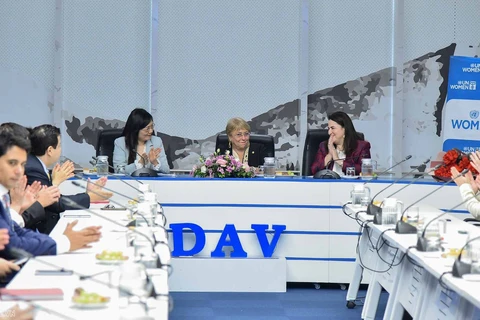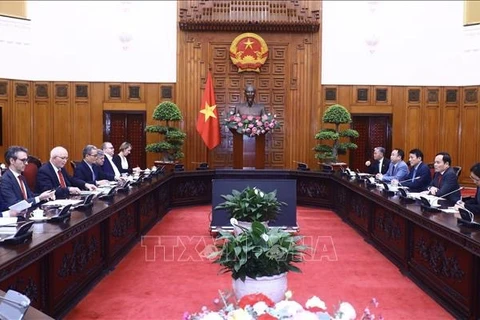Hanoi (VNA) - The Ministry of Foreign Affairs (MoFA), in collaboration with the United Nations Development Programme (UNDP) in Vietnam, organised an international workshop on “Experience in reporting under the UPR mechanism.”
In his remarks, Director of the MoFA’s Department of International Organisations Pham Hai Anh noted that since joining the Universal Periodic Review (UPR) mechanism, Vietnam has shown its seriousness and responsibility, with more recommendations accepted by the country, reaching 83% of the UPR third cycle recommendations, higher than the average of other countries.
In early 2022, Vietnam submitted its voluntary midterm report on the implementation of the UPR third cycle recommendations to the UN Human Rights Council (UNHRC), becoming one of the 39 countries that have presented the document.
For the fourth cycle, the country plans to submit its report to the council in early 2024, and the UNHRC is scheduled to approve the review during its 57th session in September the same year, according to Anh.
During the process of report compilation, Vietnam has made efforts in ensuring some principles, including the implementation of UPR recommendations in combination with its guidelines and policies on guaranteeing and prompting human rights, and building a rule-of-law socialist State, he said.
Addressing the event, UN Resident Coordinator in Vietnam Pauline Tamesis commended Vietnam’s strong commitments to ensuring policy frameworks, and combining socio-economic growth with human rights, as demonstrated in its reports.
“At the Human Rights Council, Vietnam played an important role last month in sponsoring the resolution on the ‘Commemoration of the 75th anniversary of the UDHR’. I look forward to close engagement with the Government and people of Vietnam in the implementation of this and other resolutions of the HRC,” she said.
Present at the event, Australian Ambassador Andrew Goledzinowsk lauded Vietnam’s socio-economic achievements which have enabled millions of people to escape from poverty, and access food, education and security services, saying the country’s health care has met high standards and has been growing.
He held that the Vietnamese Government has exerted great efforts in improving living standards of ethnic minority groups.
The UPR is a unique process to regularly examine human rights records of all 193 UN member states. It is a significant innovation of the HRC based on equal treatment for all countries. The UPR provides an opportunity for all States to declare what actions they have taken to improve the human rights situations in their countries and to overcome challenges to the enjoyment of human rights. Sharing of best human rights practices around the globe is embedded in the UPR. /.
In his remarks, Director of the MoFA’s Department of International Organisations Pham Hai Anh noted that since joining the Universal Periodic Review (UPR) mechanism, Vietnam has shown its seriousness and responsibility, with more recommendations accepted by the country, reaching 83% of the UPR third cycle recommendations, higher than the average of other countries.
In early 2022, Vietnam submitted its voluntary midterm report on the implementation of the UPR third cycle recommendations to the UN Human Rights Council (UNHRC), becoming one of the 39 countries that have presented the document.
For the fourth cycle, the country plans to submit its report to the council in early 2024, and the UNHRC is scheduled to approve the review during its 57th session in September the same year, according to Anh.
During the process of report compilation, Vietnam has made efforts in ensuring some principles, including the implementation of UPR recommendations in combination with its guidelines and policies on guaranteeing and prompting human rights, and building a rule-of-law socialist State, he said.
Addressing the event, UN Resident Coordinator in Vietnam Pauline Tamesis commended Vietnam’s strong commitments to ensuring policy frameworks, and combining socio-economic growth with human rights, as demonstrated in its reports.
“At the Human Rights Council, Vietnam played an important role last month in sponsoring the resolution on the ‘Commemoration of the 75th anniversary of the UDHR’. I look forward to close engagement with the Government and people of Vietnam in the implementation of this and other resolutions of the HRC,” she said.
Present at the event, Australian Ambassador Andrew Goledzinowsk lauded Vietnam’s socio-economic achievements which have enabled millions of people to escape from poverty, and access food, education and security services, saying the country’s health care has met high standards and has been growing.
He held that the Vietnamese Government has exerted great efforts in improving living standards of ethnic minority groups.
The UPR is a unique process to regularly examine human rights records of all 193 UN member states. It is a significant innovation of the HRC based on equal treatment for all countries. The UPR provides an opportunity for all States to declare what actions they have taken to improve the human rights situations in their countries and to overcome challenges to the enjoyment of human rights. Sharing of best human rights practices around the globe is embedded in the UPR. /.
VNA























